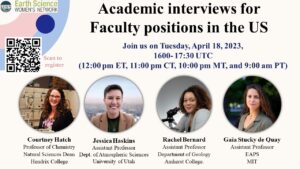Academic Faculty Interviews
The Earth Science Women’s Network will be hosting a webinar on April 18, 2023, 1600- 17:30 UTC (12:00 -1:30 pm ET, 11:00 – 12:30 pm CT, 10:00 – 11:30 pm MT, and 9:00 – 10:30 am PT) to answer all these questions and many others. A panel of assistant professors & Professors within multiple earth science disciplines will share their experiences and “lessons learned”, and answer your questions. This workshop is geared towards graduate students and post-docs considering an academic career in the US.
We will be joined by:
- Rachel Bernard (Assistant Professor, Amherst College)
- Courtney Hatch (Professor of Chemistry, Hendrix College)
- Jessica Haskins (Assistant Professor, University of Utah)
- Gaia Stucky de Quay (Assistant Professor, MIT)
Register here: https://forms.gle/J2NJwkmAuo8ToN7bA
Hope to e-see you soon!
Panelist information and bio
Rachel Bernard, Assistant Professor, Department of Geology, Amherst College.
Dr. Rachel Bernard is an Assistant Professor in the Department of Geology at Amherst College. She earned a B.S.E. in Geological Engineering from Princeton University and a PhD in Geological Sciences from the University of Texas at Austin. Before graduate school, she worked on offshore and onshore oil and gas rigs as a field engineer for Schlumberger and worked as a science assistant for the National Science Foundation’s Division of Earth Sciences. Her research focuses on understanding the rheology of the Earth’s lower crust and upper mantle; that is, how rocks at these depths flow and deform. She is also passionate about bringing attention to the lack of diversity in the geosciences and working towards change.
Courtney Hatch, Professor of Chemistry, Natural Sciences Dean, Hendrix College
Courtney Hatch holds a Ph.D. in Atmospheric/Analytical Chemistry and has been a faculty member at Hendrix College, a private 4-year liberal arts college, for 15 years. Her research interests focus on the chemistry and climate effects of atmospheric aerosols. During her time at Hendrix, she has served as the Environmental Studies Program Chair, the Chemistry Department Chair, and as an elected member of the Council on Academic Policy. Courtney currently serves as the Dean of Natural Sciences, and as such, oversees all academic staffing, faculty hiring, and faculty evaluation processes within the Natural Sciences area and has served as a search committee member or chair on more than 20 faculty searches.
Jessica Haskins, Assistant Professor, Dept. of Atmospheric Sciences, University of Utah
Jessica Haskins is an Assistant Professor at the University of Utah in the Department of Atmospheric Sciences focusing on topics related to Atmospheric Chemistry. She received her B.Sc. in Earth, Atmospheric, & Planetary Sciences from MIT in 2014, and graduated with her Ph’D in Atmospheric Sciences from the University of Washington in 2020, and completed an NSF Postdoctoral Fellowship at MIT between 2020-2022. Her specific research interests are centered around understanding and modeling the impact of heterogenous chemistry processes and the role of atypical oxidants in determining daily and seasonal variability in air quality & climate. She is an expert in tropospheric halogen chemistry, but has a variety of other interests that span topics from better understanding the sources and recycling of Cl radicals in the troposphere, to understanding the diurnal variability in NO3 radical production and losses. Ultimately, her research strives to use existing data as novel constraints for the oxidative cascade of reactions responsible for creating secondary pollutants and how that may change in the future.
Gaia Stucky de Quay, Assistant Professor, Department of earth, atmospheric and planetary sciences, Massachusetts Institute of Technology (MIT)
Gaia Stucky de Quay focuses on investigating topographic signals and landscape evolution in order to both deconvolve and quantify primary driving forces such as tectonics, climate, and local geological processes across various timescales and planetary surfaces, whether on Earth, Mars, or beyond. Stucky de Quay’s research is guided by several interrelated questions: What drives landscape evolution? Are fluvial systems a reliable proxy for climate? Can we use the relationships we see on Earth to decipher the ancient Mars hydroclimate? Can we go a step further and shed light on enigmatic surface processes we see on Titan or other icy moons? Stucky de Quay is always interested in finding new ways to address ongoing problems related to habitability, tectonics, and climate using novel and interdisciplinary techniques ranging from lab work (e.g., cosmogenic dating), to fieldwork (e.g., geomorphic mapping), to remote sensing (e.g., drone imaging), as well as theoretical studies of surface dynamics.

